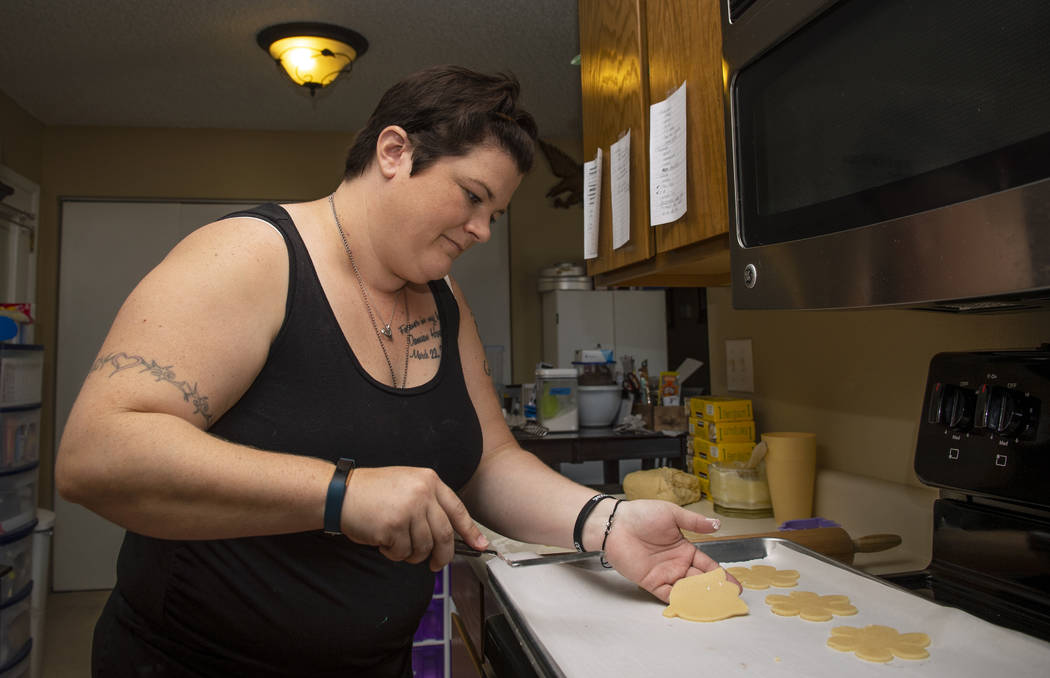Digital tech in rural businesses could grow Nevada’s workforce
From her small business in Pahrump, Jessica DeJarnett does it all.
The owner of Cakes, Cookies and Creations, DeJarnett started the business in November, a move that allowed her to simultaneously work from home and watch over her 1-year-old son, Everett. It’s a one-man show, with DeJarnett promoting, baking, decorating and delivering the sweets herself.
Her business is taking off in Pahrump, but her deliveries also include hour-long treks to Henderson and Las Vegas, something she chalks up to her online presence. She estimated about 80 percent of her customers find her through social media.
“Everybody is digital,” she said. “On Facebook and Instagram, they’re able to see how passionate I am.”
According to a recent report from the U.S. Chamber of Commerce and Amazon, technology is playing an increasing role in economic growth. The report found rural small businesses in Nevada could increase sales enough to add more than 9,800 jobs to the state over the next three years if they utilize more digital tools.
The future of growth
The March report, “Unlocking the Digital Potential of Rural America,” found the use of digital tools, including access to high-speed internet and social media, are gaining traction in rural areas, and can help expand business’ customer base.
“Technology is important everywhere, whether it’s a town of 1,000 or 1 million. It’s the future of growth for every size of business,” said Tim Day, the senior vice president for the chamber of commerce’s Chamber Technology Engagement Center.
The survey found online tools boost sales for nearly 55 percent of rural small businesses across the U.S., and nearly 20 percent of those businesses generate most of their revenue through online sales.
Overall, technology and digital tools boosted rural small business’ gross sales 17 percent over the last three years, contributing $38 billion to the annual U.S. GDP and creating nearly 300,000 full-time jobs.
And there’s still room to grow, according to the report.
“We still see a great untapped economic opportunity ahead, especially for businesses in rural America,” an Amazon spokesperson told the Review-Journal.
Lack of tools in rural America
DeJarnett said she doesn’t face many rural-related challenges with her business, although she’s used to losing cell service as she runs deliveries.
“It’s usually when I’m going over the pass to Vegas,” she said.
Pahrump has decent mobile and internet service, said Paul Miller, the executive director of the Nye County and Esmeralda County Regional Economic Development Authority. But he said there are other rural communities in his region that aren’t as lucky.
Internet connection is an “asset we can’t afford not to have anymore,” Miller said. “If there’s no broadband or no fiber and they have to rely on satellite, it can be expensive. … it would make it difficult for a business to compete.”
According to the report, high-speed internet and mobile phone connectivity are “crucial” for small, rural businesses.
Raj Tumber, a business mentor for nonprofit business advising company SCORE, said rural areas often lack infrastructure, technology and accessibility to resources and education compared to cities.
“Living in the middle of nowhere, that’s always going to be a disadvantage,” he said.
The report found rural residents make up 15 percent of the U.S. adult population, but 27 percent of rural residents still don’t have access to high-speed internet. Additionally, many rural areas lack skilled IT professionals.
Importance of technology
Tumber said that by incorporating more technology, businesses can increase their sales and revenue and, in turn, hire more people.
“Technology keeps evolving constantly. If you don’t catch up with it, you’ll fall behind,” he said.
Day said he hopes the report’s findings push local, state and federal leaders to advocate for more access to digital tools in rural America.
We want to “educate people across the country on what can be afforded to businesses if they have the right technology in place,” he said. “There’s a real need, and the ability for that growth is important.”
Miller said the state is already moving toward implementing more broadband infrastructure in rural areas.
“Technology is a great asset to the rural and what I call the frontier communities,” he said. “Without it, they would have a more difficult time being in business.”
DeJarnett said she hopes that, in time, she’ll be able to expand her business. She has dreams of opening a storefront that includes a child care facility, so her employees won’t face the same challenges she did as a working single mother.
“I want to build something from the ground-up,” she said. “That’s my big dream.”
Contact Bailey Schulz at bschulz@reviewjournal.com or 702-383-0233. Follow @bailey_schulz on Twitter.































